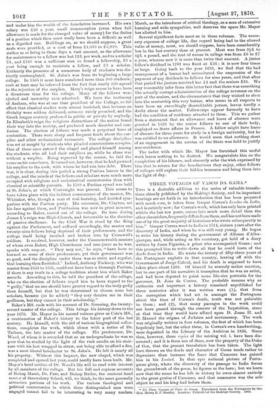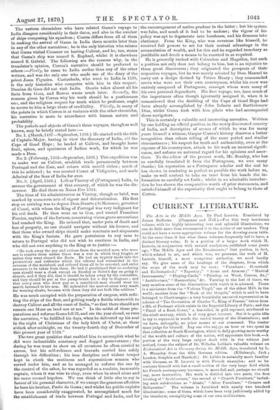THREE VOYAGES OF VASCO DA GAMA.* Tins is a desirable
addition to the series of valuable transla- tions already published by the Hakluyt Society, and its important bearings are set forth in an introduction that has been prepared with much care, is taken from Gaspar Correa's Lendas da
and is entirely new ; for Correa's work, which has only been printed within the last ten years, enters into much more detail than the- other chroniclers, frequently differs from them, and has not been made- use of by the great majority of historians who wrote subsequently to, him." Gaspar Correa went to India in 1511, sixteen years after the discovery of India, and when he was still very young. He began to write his history during the government of Alfonso d'Allm- querque, and, while acting as his secretary, got hold of a diary written by Joam Figueira, a priest who accompanied Gama ; and this prompted him to write down all that he could learn of the deeds done in India. He wrote the history of fifty-three years of the Portuguese exploits in that country, leaving off with the Government of Jorge Cabral, and his death is supposed to have- taken place about 1583. Of himself he scarcely makes mention, but in one part of his narrative it transpires that he was an artist, and had been deputed to paint some life-size portraits for the governor, D. Joao de Castro. The probable reasons why so authentic and important a history remained unpublished for three centuries after it was written were (1), that from. thecorruption which had set in amongst the Portuguese about the time of Correa's death, truth was not palatable to them ; and (2), that many passages in the work could not have passed through the censure of the Inquisition, since at that time they would have affixed upon D. Joam II. and D. Manuel the stigma of Judaism and necromancy. The work was originally written in four volumes, the first of which has been hopelessly lost, but the other three, in Correa's own handwriting, were deposited in the Library of the Archives in 1836. Since- then, however, three copies of the missing vol. i. have been dis- covered; and it is from one of these, now the property of the Duke- of Gor, that the present translation has been taken. The light here thrown on the deeds and character of Gama tends rather to. depreciate than increase the fame that Caumens has gained; him in his Lusiad. In that epic national picture of Portu- guese glory, where the discovery of the passage to India forms- the groundwork of the poem, he figures as the hero ; but we learn- now that the name he has left in history he owes almost entirely to the great genius of Camoens, and that commerce was the sole: object he and his king had before them.
The Three Voyages of Vasco do Game. Translated from the Portuguese by the. Hon. Henry E. J. Stanley. Londvn : Printed for tho Hakluyt Society_ InG.9.
The various chroniclers who have related Gama's voyage to India disagree considerably in their dates, and also in the number of ships composing his squadron ; Correa differs from all of them in making the arrival of Gama in India three months later than in any of the other narratives ; he is the only historian who relates that Gama visited Cananor on leaving Calicut, and he, too, states that Gama's ship was named S. Raphael, whilst it is elsewhere named S. Gabriel. The following are the reasons why, in the
translator's opinion, Correa's narrative should be preferred to others :—Firstly, he came to India earlier than auy of the other
writers, and was the only one who made use of the diary of the priest Joam Figueira. Castanheda, who went to India in 1528,
is the only historian who competes with him in this respect. Damian de Goes did not visit India. Osorio takes almost all his facts from Goes, and Barros wrote much later. Secondly, the reasons given by Correa why his work should be a posthumous one, and the religious respect for truth which he professes, ought to secure to him a large share of credibility. Thirdly, in many of the points in which Correa is at variance with the other chronicles,
his narrative is more in accordance with human nature and probability.
The periods and objects of Gama's three voyages, though so well known, may be briefly stated here :— No. 1. (March,1497—September, 1499.) He started with the title
of Captain-Major, having in view the discovery of India, via the
Cape of Good Hope ; he landed at Calicut, and brought home fruit, spices, and specimens of Indian work, for which he was made a Dom.
No. 2. (February, 1502—September, 1503.) This expedition was to make war on Calicut, establish trade permanently between Portugal and the East, and return with untold riches ; much of this be achieved ; he was created Count of Vidigueira, and made Admiral of the Seas of India for ever.
No. 3. (April, 1524.) Left as Viceroy of (Portuguese) India, to assume the government of that country, of which he was the dis- coverer. He died there on Xmas Eve 1524.
The time of his administration as Viceroy, though so brief, was marked by numerous acts of vigour and determination. His first step on arriving was to depose Dom Duarte (de Meneses), governor of Chaul, with whom the King of Portugal was very indignant for his evil deeds. He then went on to Goa, and ousted Francisco Pereira, captain of the fortress, concerning whom grave accusations had reached the King. He ordered that, under pain of death and loss of property, no one should navigate without his licence, and that those who owned ships should make contracts and shipments with the King's factors. He gave permission to any man to
return to Portugal who did not wish to continue in India, and who did not owe anything to the King or to justice took away the pay and rations from the married men, who were not to receive them unless there was a war in which they fought, or unless they went aboard the fleets. He had an inquiry made into the peculations and robberies which the officers had committed in the revenue of the mainland, and ordered them all to be arrested, and strict accounts to be taken from them. He had it proclaimed that no seafaring men should wear a cloak except on Sunday or Saint's day on going to church, and if they did, that it should be taken away by the constables, and they should be put at the pump-break for a day in disgrace ; and that every man who drew pay as a matchlock-man should wear his match fastened to his arm. He upbraided the men-at-arms very much for wearing cloaks, because with them they did not look like soldiers."
He was much occupied with the preparation of cargoes, with refit- ting the ships of the fleet, and getting ready a flotilla wherewith to destroy Calicut and all the coast of India, "so that there should not remain one Moor on land nor at sea." In the midst of these pre- parations and reforms Gama fell ill, and ere the year closed, so runs the narrative, " he fulfilled his days, when he delivered up his soul in the night of Christmas of the holy birth of Christ, at three o'clock after midnight, on the twenty-fourth day of December of this present year of 1524."
The two great qualities that enabled him to accomplish what he did were indomitable constancy and dogged perseverance ; the daring he was wont to show on all occasions he often carried to excess, but his self-reliance and bravado carried him safely through his difficulties; his iron discipline and violent temper kept in check the mutinous and superstitious seamen who served under him, and as he managed to enforce the one by the control of the other, he was regarded as a resolute, inexorable captain, whom it was wise to obey, even when he stood alone and his cause seemed hopeless. We can think of little else to say in favour of his personal character, if we except the generous affection he bore his brother, Paulo da Gama ; and whilst his public exploits have been considerably exaggerated, he accomplished much for the establishment of trade between Portugal and India, and for the encouragement of native produce in the latter ; but his system was false, and much of it had to be undone ; the vigour of his. policy was apt to degenerate into harshness, and his firmness into- obstinacy. From the King, who was covetous like himself, he- received full powers to act for their mutual advantage in the
accumulation of wealth, and for this end he regarded treachery as- justifiable and deceit a means to be resorted to as required.
He is generally ranked with Columbus and Magellan, but such a position not only does not belong to him, but is an injustice to, those great discoverers ; they originated the prospects of their- respective voyages, but he was merely selected by Dom Manuel to- carry out a design devised by Prince Henry ; they commanded crews who were not their own countrymen, whilst his crew was- entirely composed of Portuguese, amongst whom were many of his own personal dependents. His first voyage, too, loses much of the importance often though ignorantly assigned it, when it is remembered that the doubling of the Cape of Good Hope had been already accomplished by John Infante and Bartholomew- Dias, whilst Gama took with him pilots who had accompanied. those navigators.
This is certainly a valuable and interesting narrative. Written. by one holding an official position in the newly discovered country of India, and descriptive of scenes of which he was for many years himself a witness, G-aspar Correa's history deserves a better- recognition than others telling of the same period and similar circumstances ; his respect for truth and authenticity, even at the- expense of his countrymen, attach to his work an unusual signifi- cance, and enforce an universal regard for his opinions and asser- tions. To the editor of the present work, Mr. Stanley, who has so carefully translated it from the Portuguese, we owe many thanks ; his reputation as a Portuguese scholar and the zeal he- lms shown in rendering as perfect as possible the work before us, make us well content to take on trust from his hands the in- formation so carefully set forth ; whilst in an admirable introduc- tion he has shown the comparative worth of prior statements, an satisfied himself of the superiority that ought to belong to those of Correa.































 Previous page
Previous page